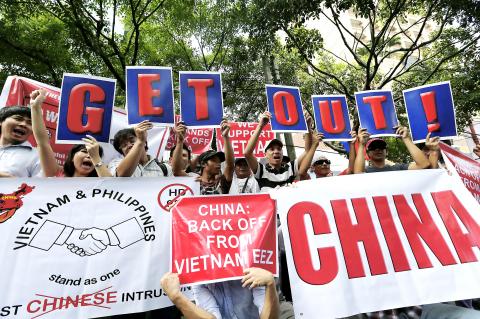An unrepentant China yesterday defended its actions in disputed Asian waters amid warnings of war with Vietnam, as Washington voiced “serious concern” after riots left two Chinese workers dead and more than 100 injured.
Vietnam has been shaken by its worst anti-China unrest in decades following Beijing’s deployment of an oil rig in contested South China Sea waters, which triggered ramming incidents involving Vietnamese and Chinese vessels.
As tensions mounted, a top Chinese general warned that Beijing “cannot afford to lose an inch” of what it considers its territory.

Photo: EPA
China has accused Hanoi of “connivance” with protesters who have targeted hundreds of foreign-owned factories in Vietnam, as long-simmering enmity between the communist rivals boiled over.
Two Chinese citizens were killed and more than 100 injured, Beijing’s foreign ministry said, expressing “serious concern.”
China’s state-run Global Times turned up the rhetoric with a strident editorial supporting the use of “non-peaceful” measures against Vietnam and the Philippines.
“The South China Sea disputes should be settled in a peaceful manner, but that doesn’t mean China can’t resort to non-peaceful measures in the face of provocation from Vietnam and the Philippines,” it said.
“Many people believe that a forced war would convince some countries of China’s sincerely peaceful intentions,” the paper added.
An Agence France-Presse photographer who was taken by Vietnamese authorities to the scene of the maritime standoff saw dozens of Chinese ships, including naval vessels, facing off against Vietnamese ships near the oil rig.
Whenever Chinese vessels approached, the Vietnamese ships broadcast messages saying: “We are warning you — you are entering Vietnamese sea waters, violating our exclusive economic zone and the law of the sea.”
At one point, what appeared to be a Chinese surveillance plane flew overhead. On land, calm seemed to have returned to flashpoint industrial zones across Vietnam yesterday after riot police were deployed to restore order.
Meanwhile, US Vice President Joe Biden on Thursday “underscored the United States’ serious concern about China’s unilateral actions in waters disputed with Vietnam” at a meeting with a top Chinese general at the White House, his office said in a statement.
“The vice president reaffirmed that while the United States does not take a position on the competing territorial claims, no nation should take provocative steps to advance claims over disputed areas in a manner that undermines peace and stability in the region,” the statement said.
Chinese Ministry of Foreign Affairs spokeswoman Hua Chunying (華春瑩) reacted frostily to Biden’s comment, saying it amounted to “intentionally taking a biased position.”
General Fang Fenghui (房峰輝), chief of the general staff of the People’s Liberation Army, said Beijing would continue to operate the rig.
“We do not make trouble. We do not create trouble. But we are not afraid of trouble,” he said.
“For the territory, which has been passed down by our ancestors into the hands of our generation, we cannot afford to lose an inch,” he said.
The general also pointed the finger at US President Batack Obama’s strategic shift toward Asia, saying it had encouraged countries such as Vietnam, Japan and the Philippines to make trouble with Beijing.
Additional reporting by Reuters

SECURITY: As China is ‘reshaping’ Hong Kong’s population, Taiwan must raise the eligibility threshold for applications from Hong Kongers, Chiu Chui-cheng said When Hong Kong and Macau citizens apply for residency in Taiwan, it would be under a new category that includes a “national security observation period,” Mainland Affairs Council (MAC) Minister Chiu Chui-cheng (邱垂正) said yesterday. President William Lai (賴清德) on March 13 announced 17 strategies to counter China’s aggression toward Taiwan, including incorporating national security considerations into the review process for residency applications from Hong Kong and Macau citizens. The situation in Hong Kong is constantly changing, Chiu said to media yesterday on the sidelines of the Taipei Technology Run hosted by the Taipei Neihu Technology Park Development Association. With

CARROT AND STICK: While unrelenting in its military threats, China attracted nearly 40,000 Taiwanese to over 400 business events last year Nearly 40,000 Taiwanese last year joined industry events in China, such as conferences and trade fairs, supported by the Chinese government, a study showed yesterday, as Beijing ramps up a charm offensive toward Taipei alongside military pressure. China has long taken a carrot-and-stick approach to Taiwan, threatening it with the prospect of military action while reaching out to those it believes are amenable to Beijing’s point of view. Taiwanese security officials are wary of what they see as Beijing’s influence campaigns to sway public opinion after Taipei and Beijing gradually resumed travel links halted by the COVID-19 pandemic, but the scale of

A US Marine Corps regiment equipped with Naval Strike Missiles (NSM) is set to participate in the upcoming Balikatan 25 exercise in the Luzon Strait, marking the system’s first-ever deployment in the Philippines. US and Philippine officials have separately confirmed that the Navy Marine Expeditionary Ship Interdiction System (NMESIS) — the mobile launch platform for the Naval Strike Missile — would take part in the joint exercise. The missiles are being deployed to “a strategic first island chain chokepoint” in the waters between Taiwan proper and the Philippines, US-based Naval News reported. “The Luzon Strait and Bashi Channel represent a critical access

Pope Francis is be laid to rest on Saturday after lying in state for three days in St Peter’s Basilica, where the faithful are expected to flock to pay their respects to history’s first Latin American pontiff. The cardinals met yesterday in the Vatican’s synod hall to chart the next steps before a conclave begins to choose Francis’ successor, as condolences poured in from around the world. According to current norms, the conclave must begin between May 5 and 10. The cardinals set the funeral for Saturday at 10am in St Peter’s Square, to be celebrated by the dean of the College